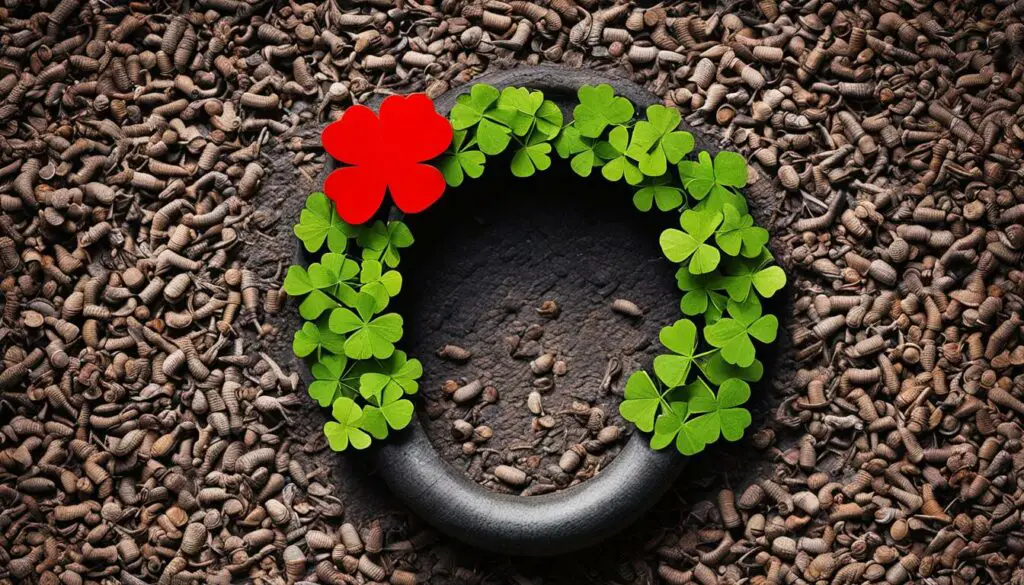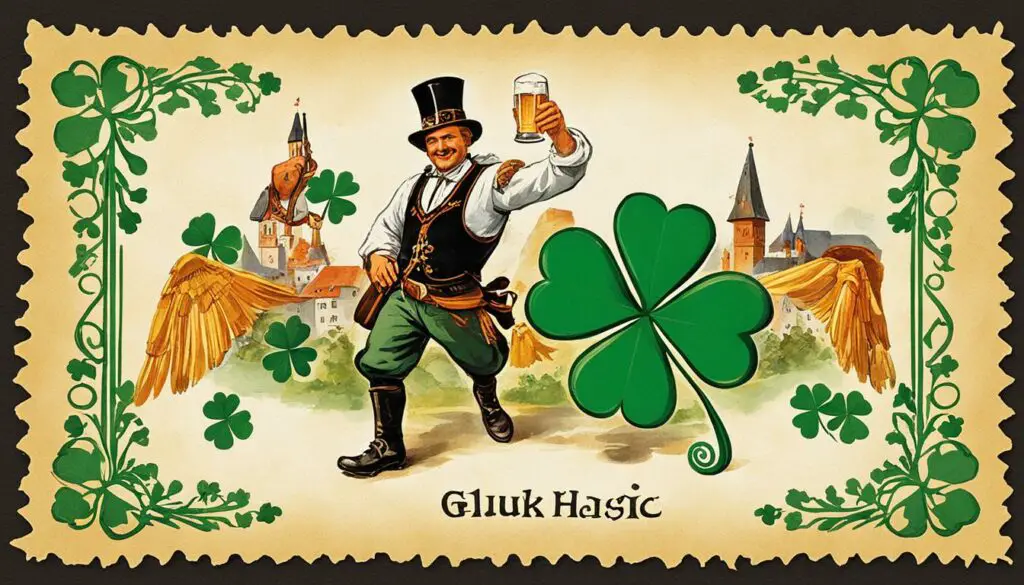Knowing how to wish someone good luck in their native language is a thoughtful gesture that can make a meaningful impact. In German, there are several expressions to convey this sentiment, each with its own unique meaning and usage. Whether you’re encouraging a friend, supporting a colleague, or simply want to spread some positive vibes, learning how to say good luck in German allows you to add an authentic touch to your well-wishes.
Key Takeaways:
- “Viel Glück” is the most commonly used phrase for “good luck” in German.
- “Viel Erfolg” is an alternative expression that emphasizes personal responsibility and individual effort for success.
- Other unique phrases like “Hals- und Beinbruch” and “Toi toi toi” can also be used to wish someone good luck in different contexts.
- Offering words of encouragement in German, such as “Du bist toll!” or “Du wirst das ganz toll machen!” can boost someone’s confidence.
- Understanding cultural customs and being sincere in your well-wishing is important when expressing good luck in German.
How to Say Good Luck in German
When it comes to expressing good luck in German, the phrase “Viel Glück” is commonly used. This straightforward phrase translates to “good luck” and is widely recognized and understood in German-speaking countries. By using “Viel Glück,” you can confidently convey your best wishes to someone in a simple and direct way.
Another phrase commonly used in German to convey good luck is “viel Erfolg.” Translating to “good success,” this phrase emphasizes personal responsibility and the belief that individuals have control over their own luck. When someone is embarking on a new endeavor or aiming to prove themselves, the phrase “viel Erfolg” conveys the message that success depends on their efforts and encourages them to give their best.
In addition to these two main phrases, there are other unique expressions and cultural variations for wishing good luck in German. Exploring these variations can add depth and authenticity to your well-wishes. Here are some other phrases you can use:
- Hals- und Beinbruch: Literally meaning “break a leg,” this phrase originated in theater circles but has since become a general expression of good luck and encouragement in various contexts.
- Toi toi toi: Derived from the practice of touching wood three times for good luck, this phrase is often used to wish someone success before a performance or important event.
Knowing how to express good luck in German opens doors to meaningful interactions and cultural understanding. Whether you choose the straightforward “Viel Glück” or explore these unique expressions, your well-wishes in German will be appreciated and convey your genuine support.
Other Ways to Express Good Luck in German
Aside from “Viel Glück” and “viel Erfolg,” there are other ways to express good luck in German. One common phrase is “Hals- und Beinbruch,” which literally means “break a leg.” Although this phrase originated in the theater world, it is also used in other contexts to wish someone success and encourage them to be brave and resilient. Another expression is “Toi toi toi,” which is believed to have originated from the practice of touching wood three times for good luck.
Let’s explore these phrases further:
“Hals- und Beinbruch” – Literally meaning “break a leg,” this phrase is often used to wish someone good luck before a performance or any undertaking. It conveys the idea of being fearless and facing challenges head-on. Despite the literal translation, it is not meant to actually wish harm upon someone, but rather to encourage them to give their best and overcome obstacles.
“Toi toi toi” – This phrase is commonly used in Germany as a superstitious way to wish someone good luck. It is believed to have originated from the practice of touching wood three times, as a symbol of good luck. Saying “Toi toi toi” is considered a way to ward off any potential bad luck and to ensure that things go smoothly. It is often used before an important event or performance.
These alternative expressions provide a unique and culturally-rich way to extend your well-wishes and express good luck in German.
Comparison of Good Luck Expressions in German
| Phrase | Meaning | Context |
|---|---|---|
| Viel Glück | Good luck | General |
| Viel Erfolg | Good success | Personal Achievements |
| Hals- und Beinbruch | Break a leg | Performances, Challenges |
| Toi toi toi | Superstitious good luck | Performances, Superstitions |
These phrases capture the diversity of expressions used to wish good luck in German. From the traditional “Viel Glück” to the more quirky “Hals- und Beinbruch” and “Toi toi toi,” each phrase offers a distinct way to show support and convey well-wishes.
Words of Encouragement in German

Apart from wishing someone good luck, it’s also thoughtful to offer words of encouragement in German. When you want to uplift someone’s spirits or boost their confidence, consider using these phrases:
- “Du bist toll!” – This means “You are awesome!” and is a great way to show someone that you believe in their abilities.
- “Du wirst das ganz toll machen!” – Translate as “You’re going to do great!” Use this phrase to motivate someone before a test, sports game, or important event.
To effectively encourage someone in German, it’s essential to be sincere and genuine in your words. These phrases convey positivity and support, helping to create a positive and uplifting environment.
Remember, words have the power to inspire and motivate, so take the opportunity to offer words of encouragement in German whenever you can.
German Good Luck Symbols

In Germany, there are various symbols associated with good luck. These symbols hold cultural significance and are believed to bring positive energy and fortune. Let’s explore some of the popular German good luck symbols:
Pigs: A Lucky Charm
Pigs are considered lucky in German culture. There is a common German phrase, “Schwein haben,” which translates to “to have pig.” This phrase is used to refer to being lucky. It is believed that pigs symbolize prosperity, wealth, and good fortune. As a result, many Germans keep pig figurines or images in their homes or give them as gifts to wish good luck in various endeavors.
Chimney Sweepers: Touch for Luck
Chimney sweepers, or Schornsteinfeger in German, are also seen as lucky symbols. In German folklore, chimney sweepers are associated with bringing good luck and warding off evil spirits. It is considered fortunate to touch a chimney sweeper’s buttons or shoulders when you encounter one. This act is believed to bring good luck and ensure success in future endeavors.
Marzipan Good Luck Symbols
Marzipan figurines shaped like good luck symbols are popular in Germany, particularly during New Year’s celebrations. These edible figurines come in various shapes, such as four-leaf clovers, horseshoes, and ladybugs. Germans often exchange marzipan symbols as gifts to wish good luck and prosperity for the coming year.
German good luck symbols encompass pigs, chimney sweepers, and marzipan figurines. Each symbol represents different aspects of good luck and is used in various contexts to convey wishes for success and prosperity.
Watching a Lucky Movie in German

One fun way to learn a language is by watching movies or shows in that language. In German, there is a movie called “Luck” (Glück) directed by Peggy Holmes. This animated movie explores the theme of luck and can be a great way to improve your language skills while enjoying a captivating story. Watching movies in German can also help you become familiar with the language’s pronunciation and nuances.
Words of Encouragement in German Business Contexts
In a business context, it’s important to offer words of encouragement and support to colleagues and employees. In German, you can say “Viel Glück bei deinem Vorstellungsgespräch!” to mean “Good luck on your job interview!” or “Viel Erfolg mit dem neuen Projekt!” to say “Good success with that new project!” These phrases show your belief in someone’s abilities and your desire for their success in their career endeavors.
| German Phrase | English Translation |
|---|---|
| Viel Glück bei deinem Vorstellungsgespräch! | Good luck on your job interview! |
| Viel Erfolg mit dem neuen Projekt! | Good success with that new project! |
Strategies for Memorizing German Phrases for Good Luck

Memorizing German phrases for good luck can be a fun and effective way to enhance your language skills. Here are some strategies to help you remember these phrases:
- Break it down: One approach is to break down the phrases into smaller parts and practice them separately. This can make the phrases more digestible and easier to remember. For example, if you’re learning the phrase “Hals- und Beinbruch,” you can break it down into “Hals” (neck), “und” (and), and “Beinbruch” (leg break). Practice each word individually before putting them together.
- Create associations: Another technique is to create visual images or associations with the phrases. This can help make them more memorable. For instance, if you’re learning the phrase “Viel Glück,” you can imagine a lucky four-leaf clover alongside the phrase. This visual cue can help trigger your memory when you need to recall the phrase.
- Use flashcards: Flashcards are an effective tool for memorization. Write the German phrases for good luck on one side of the card and their translations on the other side. Test yourself regularly by flipping through the flashcards and trying to recall the translations. This repetition will reinforce your memory and improve retention.
By utilizing these strategies, you can enhance your ability to remember German phrases for good luck and confidently use them in conversations.
Effective Strategies for Memorizing German Phrases for Good Luck
| Strategy | Description |
|---|---|
| Break it down | Divide phrases into smaller parts and practice them separately. |
| Create associations | Form visual images or associations with the phrases to aid memory. |
| Use flashcards | Write phrases and translations on flashcards for regular practice and reinforcement. |
With these techniques and a bit of practice, you’ll soon find yourself confidently using German phrases for good luck in your conversations. Viel Glück!
Cultural Tips for Wishing Good Luck in German

When wishing good luck in German, it’s important to consider cultural customs and traditions. Here are some cultural tips to keep in mind:
- Be mindful of context: Certain phrases, like “Hals- und Beinbruch” (break a leg), are commonly used in the theater world but may not be appropriate in other contexts. Make sure to choose phrases that are suitable for the situation.
- Stick to common phrases: When in doubt, it’s always safe to use common phrases like “Viel Glück” (good luck) or “Alles Gute” (all the best). These phrases are universally understood and can be used in various situations.
- Be sincere and genuine: Germans value authenticity in their interactions, so when wishing someone good luck, make sure to be sincere and genuine. Your well-wishes will be more meaningful when they come from the heart.
By keeping these cultural tips in mind, you can ensure that your well-wishes are respectful and appropriate in German-speaking contexts.
Importance of Wishing Good Luck in German
Wishing someone good luck in their endeavors is more than just a polite gesture – it holds significant value and meaning. In German culture, offering well-wishes is a common practice that reflects kindness, consideration, and genuine care for others. By expressing good luck wishes in German, you not only strengthen your relationships but also demonstrate your understanding and appreciation of the local culture.
When you wish someone “Viel Glück” or “Hals- und Beinbruch” in German, you convey your support and encouragement for their journey or upcoming challenges. These well-wishes create a positive and uplifting atmosphere, fostering a sense of camaraderie and unity. It shows that you genuinely want the best for the other person and are rooting for their success.
Moreover, by using German phrases for good luck, you add a personal touch to your interactions. It displays your effort to engage with the language and culture, which is highly appreciated by native German speakers. This small act of cultural awareness can make a lasting impression and help you establish deeper connections with others.
Wishing someone good luck is like planting a seed of positivity and hope. It creates a ripple effect, spreading good vibes and uplifting the spirits of those involved.
Whether you’re wishing a friend, family member, colleague, or stranger good luck in their exams, job interview, or any other endeavor, your well-wishes have the power to inspire, motivate, and instill confidence. It’s an acknowledgment of their efforts and a reminder that they are not alone in their journey.
Benefits of Wishing Good Luck in German:
- Strengthens relationships
- Shows support and encouragement
- Adds a personal touch to interactions
- Demonstrates cultural understanding and appreciation
- Inspires and motivates
- Fosters a positive and uplifting atmosphere
In a world that can sometimes feel overwhelming or uncertain, offering good luck wishes in German is a simple yet impactful way to spread positivity and create meaningful connections. So, why not embrace this cultural tradition and wish someone good luck in German today?
Conclusion
In conclusion, knowing how to say good luck in German allows you to convey your best wishes in a more authentic way. From the common phrase “Viel Glück” to unique expressions like “Hals- und Beinbruch,” each phrase carries its own meaning and can be used in different contexts. Whether you’re encouraging a friend, supporting a colleague, or wishing someone success in their endeavors, using these phrases in German adds a touch of authenticity to your well-wishes. So, next time you want to wish someone good luck in German, remember these phrases and spread some positive vibes!
FAQ
How do you say good luck in German?
The most common phrase for good luck in German is “Viel Glück.”
What is the German word for good luck?
The German word for good luck is “Glück.”
How do you express good luck in German?
You can express good luck in German by saying phrases like “Viel Glück” or “Hals- und Beinbruch.”
What is the German equivalent of good luck?
The German equivalent of good luck is “Glück.”
How do you say good luck in German?
Good luck in German can be expressed by saying phrases like “Viel Glück” or “Alles Gute.”
How to say good luck in German?
To say good luck in German, you can use phrases like “Viel Glück” or “Hals- und Beinbruch.”
What is the German phrase for good luck?
The German phrase for good luck is “Viel Glück.”
How do you express good luck in German?
Good luck can be expressed in German by saying phrases like “Viel Glück” or “Hals- und Beinbruch.”
What is the German term for good luck?
The German term for good luck is “Glück.”
What is the German translation for good luck?
The German translation for good luck is “Glück.”
